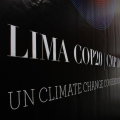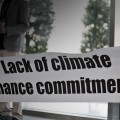Day 9 at COP20
Malcolm J | December 11, 2014.
The climate world shifted their attention shifted outside of the stuffy COP20 plenaries yesterday to the streets of Lima. Over 20,000 people, led by a passionate group of Indigenous communities from across Latin America, took to the streets in a call for climate justice. Carrying signs, singing and chanting, the atmosphere was positive despite the sombre call for an end to fossil fuels, among many other messages. It is only fitting that the largest climate march ever in Latin America fell on International Human Rights Day.
Changing climatic patterns, such as extended droughts, higher rainfall, and sea level rise, will disrupt the ability of countries to ensure the ‘fundamental freedoms’ described in the 1948 with the Universal Declaration of Human Rights. In Lima, there has only been one suggestion to include human right indicators in the 2015 text.
Ministers articulated what they are looking for in the last few days. Although there are hundreds of countries sitting around the table, it turns out there are only a few that have the power to ensure an agreement to text for Paris.
Increasing tensions in the ADP were evident as discussions turned to financing with developing countries adamant that developed countries should come forward with quantitative contributions, on means of implementation for mitigation and adaptation.
“If there is an expectation developing countries will put forward mitigation, this has to come with support from developed countries,” stated the Brazilian delegation, “but developed countries warned against prejudging the outcome of Paris negotiations on financing.”
Much to the delight of the media was the arrival of Ban Ki-moon, who provided encouraging words to the exhausted delegates based on the success that was built earlier this year at the Climate Summit. He was greeted by a hundred Peruvian children who delivered an Avaaz petition signed by 2.2 million people calling for 100% renewable energy.
Similar sentiments were echoed by Al Gore who presented on the danger and opportunity of the climate crisis to a packed plenary. Displaying an array of locations around the globe that are already being impacted by a changing climate, his conclusion called for putting a price on denial in politics and a price on carbon in markets. He also touted the recent China and US agreement as a demonstration of commitment from the two largest economies in the world.
Success in combating climate change took centre stage in the evening at the Momentum for Change showcase event, where the 12 winners received their awards. The lighthouse activities, aptly named for their potential to light the way forward, fell under four categories: women empowerment, urban poor, innovative financial schemes, and ICT (information communication technologies. The projects underscore the commitment of people to solve problems for a better world. “There is much work to be done, but these innovations are improving lives around the world,” Ban had to say.
Beating hard, the music from the Momentum for Change event provided excitement for what was a placid day of negotiations. Looking forward to day ten of the negotiations, The Verb will be watching the US and Brazil closely. The US as they take a step back, hoping to end the event on time and delay decision making until Paris. And Brazil for their recent submission that has sparked interest across COP20.












comment